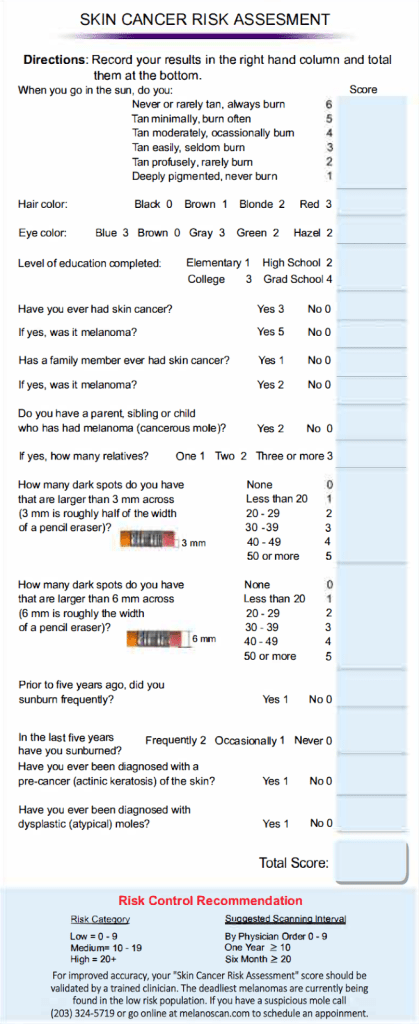
Introducing DermVan, a mobile scanning service.
Rather than returning to business as usual, we are meeting the sudden return in demand for our dermatology services with a deepened respect for our patients who might be compromised by unnecessary contact. In the face of this need for interpersonal space our clinical dermatology team has pivoted to delivering the scanning component of our services on a mobile platform. Initially this service will be weather dependent and offered to families who are sheltering in place who are within 5 miles of our practice location on 50 Glenbrook Road, Stamford, Connecticut.
For more information, click here.
Why should I be in a scanning program?
Early melanomas are best distinguished by their subtle changes. The likelihood of widespread, deadly disease is related to the delay in detection and treatment of the cancer. Early phase of melanomas is routinely overlooked by patients, primary care physicians as well as dermatologists. Melanoscan fills this gap.

A Melanoscan provides the clear evidence of the state of your skin, the hallmark of precision skin care. Melanoma screening is its most common application.

The Melanoscan is a patented medical imaging system that captures whole body images and video. It has been shown to aid dermatologists in the physical examination in a highly productive fashion, especially in the mission of early discovery of melanoma and non-melanoma skin cancers.
What is the procedure?
The entire imaging process is comfortable and automated, taking approximately five minutes. A synchronized series of images will then be taken as automated audio instructions direct you through the procedure.

How often should I have a Melanoscan?
As often as your doctor recommends it, however, our data suggests that the scan should be performed at least yearly as this tempo yields nearly 100% protection against deadly skin cancer, invasive melanoma.

About the Inventor:
 Rhett Drugge, MD, is a board certified dermatologist who has practiced in Stamford, Connecticut, since 1992. A 1981 graduate of Harvard University, he first distinguished himself in medical research at Yale School of Medicine by working on the team which in 1984 discovered the receptor for the major drug currently used in organ transplantation. Dr. Drugge received his medical degree from New York Medical College in 1988, going on to intern at New York University’s VA Medical Center. A three year dermatology residency at the University of Michigan completed his specialty medical training in 1992.
Rhett Drugge, MD, is a board certified dermatologist who has practiced in Stamford, Connecticut, since 1992. A 1981 graduate of Harvard University, he first distinguished himself in medical research at Yale School of Medicine by working on the team which in 1984 discovered the receptor for the major drug currently used in organ transplantation. Dr. Drugge received his medical degree from New York Medical College in 1988, going on to intern at New York University’s VA Medical Center. A three year dermatology residency at the University of Michigan completed his specialty medical training in 1992.
Since then, Dr. Drugge has taught dermatology at NYU, and authored numerous scientific publications.
He is the chief editor of the Electronic Textbook of Dermatology and president of the Internet Dermatology Society. His research and pioneering use of medical digital imaging dates back to the earliest days of public Internet and the emergence of consumer based digital camera technologies.
Melanoscan U.S. Patents Nos. 7,359,748 and 10,342,431
